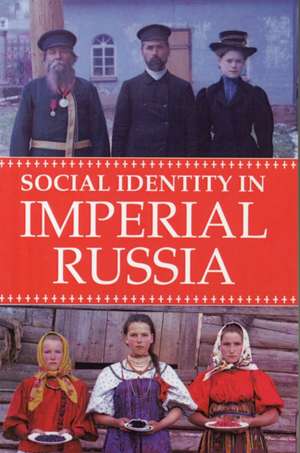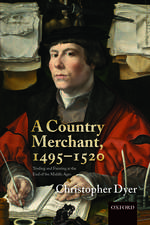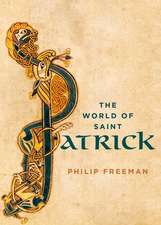Social Identity in Imperial Russia: NIU Series in Slavic, East European, and Eurasian Studies
Autor Elise Kimerling Wirtschafteren Limba Engleză Paperback – 17 aug 2015
A broad, panoramic view of Russian imperial society from the era of Peter the Great to the revolutions of 1917, Wirtschafter’s study sets forth a challenging interpretation of one of the world’s most powerful and enduring monarchies. A sophisticated synthesis that combines extensive reading of recent scholarship with archival research, it focuses on the interplay of Russia’s key social groups with one another and the state. The result is a highly original history of Russian society that illuminates the relationships between state building, large-scale social structures, and everyday life.
Beginning with an overview of imperial Russia’s legal and institutional structures, Wirtschafter analyzes the “ruling” classes and service elites (the land-owning nobility, the civil and military servicemen, the clergy) and then examines the middle groups (the raznochintsy, the commercial-industrial elites, the professionals, the intelligentsia) before turning to the peasants, townspeople, and factory workers. Wirtschafter argues that those very social, political, and legal relationships that have long been viewed as sources of conflict and crisis in fact helped to promote integration and foster the stability that ensured imperial Russia’s survival.
Beginning with an overview of imperial Russia’s legal and institutional structures, Wirtschafter analyzes the “ruling” classes and service elites (the land-owning nobility, the civil and military servicemen, the clergy) and then examines the middle groups (the raznochintsy, the commercial-industrial elites, the professionals, the intelligentsia) before turning to the peasants, townspeople, and factory workers. Wirtschafter argues that those very social, political, and legal relationships that have long been viewed as sources of conflict and crisis in fact helped to promote integration and foster the stability that ensured imperial Russia’s survival.
| Toate formatele și edițiile | Preț | Express |
|---|---|---|
| Paperback (1) | 136.13 lei 3-5 săpt. | |
| Northern Illinois University Press – 17 aug 2015 | 136.13 lei 3-5 săpt. | |
| Hardback (1) | 197.09 lei 6-8 săpt. | |
| Northern Illinois University Press – 30 sep 1997 | 197.09 lei 6-8 săpt. |
Din seria NIU Series in Slavic, East European, and Eurasian Studies
-
 Preț: 138.18 lei
Preț: 138.18 lei -
 Preț: 89.68 lei
Preț: 89.68 lei -
 Preț: 197.11 lei
Preț: 197.11 lei -
 Preț: 185.88 lei
Preț: 185.88 lei -
 Preț: 239.52 lei
Preț: 239.52 lei -
 Preț: 169.95 lei
Preț: 169.95 lei -
 Preț: 131.39 lei
Preț: 131.39 lei -
 Preț: 130.71 lei
Preț: 130.71 lei -
 Preț: 216.21 lei
Preț: 216.21 lei -
 Preț: 219.33 lei
Preț: 219.33 lei -
 Preț: 114.05 lei
Preț: 114.05 lei -
 Preț: 238.40 lei
Preț: 238.40 lei -
 Preț: 255.55 lei
Preț: 255.55 lei -
 Preț: 179.03 lei
Preț: 179.03 lei -
 Preț: 205.71 lei
Preț: 205.71 lei -
 Preț: 190.06 lei
Preț: 190.06 lei -
 Preț: 153.39 lei
Preț: 153.39 lei -
 Preț: 255.62 lei
Preț: 255.62 lei -
 Preț: 127.66 lei
Preț: 127.66 lei -
 Preț: 200.18 lei
Preț: 200.18 lei -
 Preț: 131.46 lei
Preț: 131.46 lei -
 Preț: 285.23 lei
Preț: 285.23 lei -
 Preț: 191.59 lei
Preț: 191.59 lei -
 Preț: 175.99 lei
Preț: 175.99 lei -
 Preț: 215.93 lei
Preț: 215.93 lei -
 Preț: 177.43 lei
Preț: 177.43 lei -
 Preț: 150.97 lei
Preț: 150.97 lei -
 Preț: 283.86 lei
Preț: 283.86 lei -
 Preț: 185.25 lei
Preț: 185.25 lei -
 Preț: 216.00 lei
Preț: 216.00 lei -
 Preț: 214.64 lei
Preț: 214.64 lei -
 Preț: 178.19 lei
Preț: 178.19 lei -
 Preț: 136.13 lei
Preț: 136.13 lei -
 Preț: 201.03 lei
Preț: 201.03 lei -
 Preț: 351.49 lei
Preț: 351.49 lei -
 Preț: 185.82 lei
Preț: 185.82 lei -
 Preț: 108.71 lei
Preț: 108.71 lei -
 Preț: 191.37 lei
Preț: 191.37 lei -
 Preț: 118.20 lei
Preț: 118.20 lei -
 Preț: 261.47 lei
Preț: 261.47 lei -
 Preț: 202.52 lei
Preț: 202.52 lei -
 Preț: 162.54 lei
Preț: 162.54 lei -
 Preț: 223.69 lei
Preț: 223.69 lei -
 Preț: 270.18 lei
Preț: 270.18 lei -
 Preț: 158.38 lei
Preț: 158.38 lei
Preț: 136.13 lei
Nou
Puncte Express: 204
Preț estimativ în valută:
26.06€ • 26.85$ • 21.100£
26.06€ • 26.85$ • 21.100£
Carte disponibilă
Livrare economică 10-24 februarie
Preluare comenzi: 021 569.72.76
Specificații
ISBN-13: 9780875807287
ISBN-10: 0875807283
Pagini: 272
Dimensiuni: 152 x 229 x 18 mm
Greutate: 0.39 kg
Ediția:1
Editura: Northern Illinois University Press
Colecția Northern Illinois University Press
Seria NIU Series in Slavic, East European, and Eurasian Studies
ISBN-10: 0875807283
Pagini: 272
Dimensiuni: 152 x 229 x 18 mm
Greutate: 0.39 kg
Ediția:1
Editura: Northern Illinois University Press
Colecția Northern Illinois University Press
Seria NIU Series in Slavic, East European, and Eurasian Studies
Recenzii
"A work of meticulous scholarship.... Readers will attain a rare sense of emotional and moral engagement in the Russian society of the era."
—Richard Stites, Georgetown University
"A wonderfully conceived work of cultural history, well researched in its chosen primary sources, well structured, and well written."
—James Cracraft, University of Illinois at Chicago
"A path-breaking and fascinating book from a prolific scholar."
—Christine D. Worobec, author of Possessed
—Richard Stites, Georgetown University
"A wonderfully conceived work of cultural history, well researched in its chosen primary sources, well structured, and well written."
—James Cracraft, University of Illinois at Chicago
"A path-breaking and fascinating book from a prolific scholar."
—Christine D. Worobec, author of Possessed
“An important, stimulating, and useful contribution to our understanding of Russian society.”
—Canadian Slavonic Papers
“Wirtschafter has written a book that every historian of imperial Russia will need to read. . . . [S]he offers a challenging countermodel to traditional interpretations of Russian social history.”
—Times Literary Supplement
“An invaluable source of detailed information and compelling interpretations about social identities in imperial Russia.”
—Irish Slavonic Studies
—Canadian Slavonic Papers
“Wirtschafter has written a book that every historian of imperial Russia will need to read. . . . [S]he offers a challenging countermodel to traditional interpretations of Russian social history.”
—Times Literary Supplement
“An invaluable source of detailed information and compelling interpretations about social identities in imperial Russia.”
—Irish Slavonic Studies
Notă biografică
Elise Kimerling Wirtschafter is professor of history at California State Polytechnic University in Pomona. She is the author of several books, including Religion and Enlightenment in Catherinian Russia (NIU Press, 2013).
Cuprins
Table of Contents
Preface
1. Theater and Society
2. The Social Meaning of Plays
3. The Patriarchal Household
4. Civic Society
5. The Common Good
6. Moral Monarchy
Conclusion—The Individual in Society and Polity
Appendix—Biographies of Authors
Abbreviations
Notes
Bibliography
Index
1. Theater and Society
2. The Social Meaning of Plays
3. The Patriarchal Household
4. Civic Society
5. The Common Good
6. Moral Monarchy
Conclusion—The Individual in Society and Polity
Appendix—Biographies of Authors
Abbreviations
Notes
Bibliography
Index
Descriere
How did enlightened Russians of the eighteenth century understand society? And how did they reconcile their professed ideals of equality and justice with the authoritarian political structures in which they lived? Historian Elise Wirtschafter turns to literary plays to reconstruct the social thinking of the past and to discover how Enlightenment Russians understood themselves.
Opening with an illuminating discussion of the development of theater in eighteenth-century Russia, Wirtschafter goes on to explore dramatic representations of key social questions. Based on an examination of nearly 300 secular plays written during the last half of the century, she shows how dramas for the stage represented and debated important public issues—such as the nature of the common good, the structure of the patriarchal household, the duty of monarchs, and the role of the individual in society.
Wirtschafter presents a striking reconstruction of the way educated Russians conceptualized a society beyond the immediate spheres of household and locality. Seeking to highlight problems of "social consciousness," she asks what Enlightenment Russians thought about social experience—and how their ideas related to actual social relationships in a society organized around serfdom and absolute monarchy. She portrays Russian Enlightenment culture on its own terms, while at the same time shedding light on broader problems of social order and political authority in imperial Russia.
Opening with an illuminating discussion of the development of theater in eighteenth-century Russia, Wirtschafter goes on to explore dramatic representations of key social questions. Based on an examination of nearly 300 secular plays written during the last half of the century, she shows how dramas for the stage represented and debated important public issues—such as the nature of the common good, the structure of the patriarchal household, the duty of monarchs, and the role of the individual in society.
Wirtschafter presents a striking reconstruction of the way educated Russians conceptualized a society beyond the immediate spheres of household and locality. Seeking to highlight problems of "social consciousness," she asks what Enlightenment Russians thought about social experience—and how their ideas related to actual social relationships in a society organized around serfdom and absolute monarchy. She portrays Russian Enlightenment culture on its own terms, while at the same time shedding light on broader problems of social order and political authority in imperial Russia.








